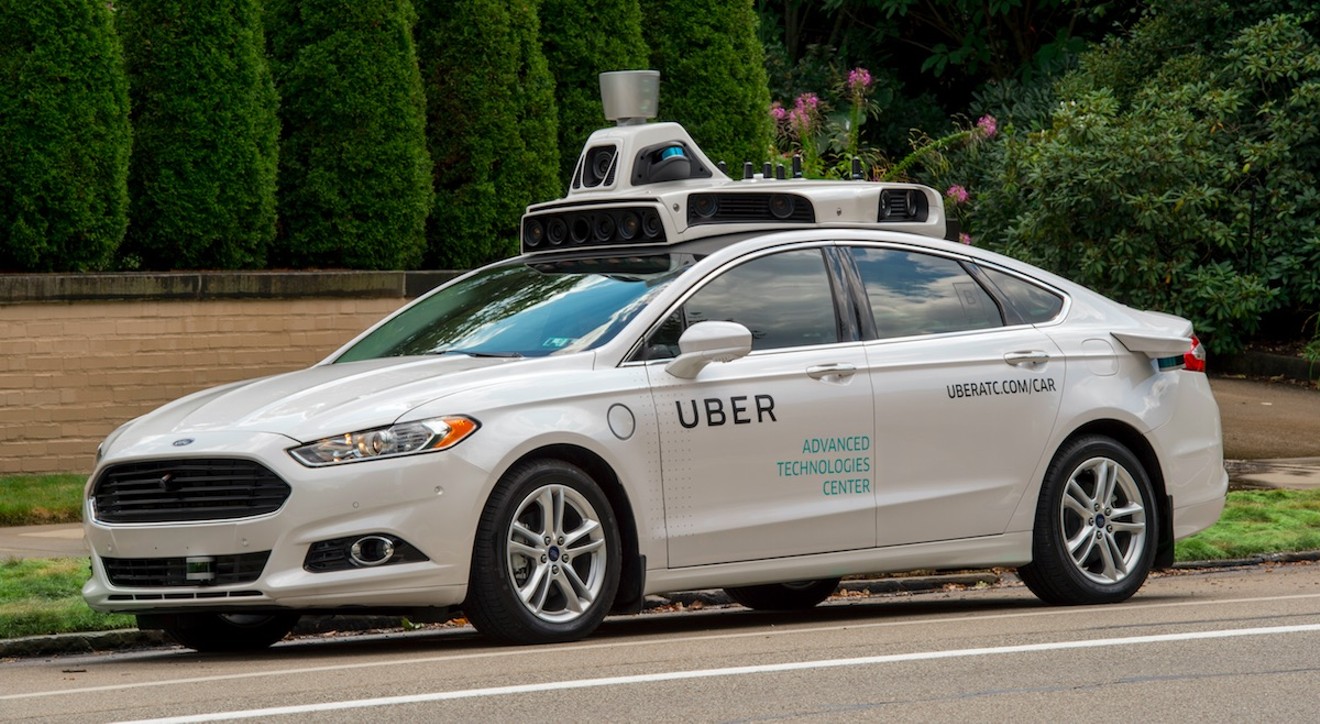The Florida Legislature today passed a bill legalizing the use of self-driving cars statewide. The bill also stipulates that Florida residents will be allowed to hire self-driving cars through, ahem, some digital phone apps.
Naturally, Uber — which could save gobs of money by replacing human drivers with robots — is quite pleased. The company released a statement today thanking Florida lawmakers for their work. The bill now awaits Gov. Ron DeSantis' signature.
"On behalf of Uber, we thank the Florida Legislature and their leadership in helping Florida continue to be a leader in welcoming self-driving technology," Stephanie Smith, Uber's senior policy manager, said in a media release. "This measure provides direction on the roles of state and local government and authorization for the deployment of automated vehicles on a ridesharing network. These provisions establish a clear pathway to bring the benefits of automation to our state."
State records show four Uber lobbyists met with state representatives on the House version of the bill, HB 311.
The passage raises some obvious red flags for those who make a living driving cars for Uber and Lyft, however. Rideshare drivers for years have feared the companies would one day replace human workers with automated cars. Today's bill clears the way for that reality in Florida.
The Senate bill, SB 932, legalizes not only automated vehicles but also "on-demand autonomous vehicle networks," defined as a service that uses "a software application or other digital means to connect passengers to fully autonomous vehicles, exclusively or in addition to other vehicles, for transportation, including for-hire transportation and transportation for compensation."
Uber has already been testing self-driving cars in other states. The company rolled out self-driving cars in Pittsburgh before expanding its initiative to Arizona. But the company shelved the project in May 2018 after one of the company's self-driving Volvo XC-90 SUVs struck and killed a pedestrian. Uber was not found criminally liable. (Scientists say self-driving cars are still less prone to accidents than human drivers.) Uber relaunched its autonomous vehicle program in Pittsburgh last December.
But while the company is hashing out basic technological issues, workers are waiting with baited breath. Uber currently loses ungodly sums of money each year: In 2018 alone, the company reported a $1.8 billion loss. Analysts noted Uber and Lyft both appear to be banking on saturating the ridesharing market — forcing cabbies and other drivers out of business — and then raising prices while acting as an oligopoly. Drivers have warned that as self-driving technology becomes cheaper, the company will one day begin axing workers. In June 2018, the Verge reported that amid a brewing "crisis in labor," Uber, Lyft, Google, Ford, Chrysler, Toyota, FedEx, and the American Trucking Association had formed a 501(c)(6) nonprofit designed to study the ways in which self-driving fleets of cars could put people out of work.
“Concern for the safety of workers and the public is paramount to" the Partnership for Transportation Innovation and Opportunity, the group told the Verge last year. “And safe deployment of [autonomous vehicle] technology is fundamental to securing better job opportunities for workers, so we plan to engage with a variety of concerned stakeholders already having conversations and planning for this transition to an autonomous vehicle future.”
In the meantime, self-driving cars are already scooting around Miami. In 2018, Ford began testing self-driving delivery cars the company bragged would be cheaper than human drivers.
"A self-driving vehicle won’t need to be tipped, and it won’t park illegally," the company's PR materials noted.
[
{
"name": "Air - MediumRectangle - Inline Content - Mobile Display Size",
"component": "19274298",
"insertPoint": "2",
"requiredCountToDisplay": "2"
},{
"name": "Editor Picks",
"component": "17482312",
"insertPoint": "4",
"requiredCountToDisplay": "1"
},{
"name": "Inline Links",
"component": "18711090",
"insertPoint": "8th",
"startingPoint": 8,
"requiredCountToDisplay": "7",
"maxInsertions": 25
},{
"name": "Air - MediumRectangle - Combo - Inline Content",
"component": "17482310",
"insertPoint": "8th",
"startingPoint": 8,
"requiredCountToDisplay": "7",
"maxInsertions": 25
},{
"name": "Inline Links",
"component": "18711090",
"insertPoint": "8th",
"startingPoint": 12,
"requiredCountToDisplay": "11",
"maxInsertions": 25
},{
"name": "Air - Leaderboard Tower - Combo - Inline Content",
"component": "17482313",
"insertPoint": "8th",
"startingPoint": 12,
"requiredCountToDisplay": "11",
"maxInsertions": 25
}
]












